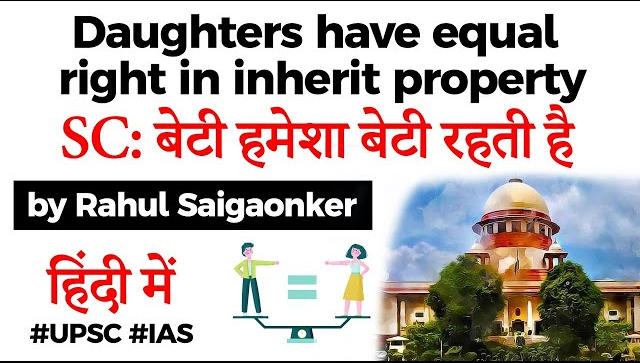Table of Contents
Daughters have equal property rights.

- The Supreme Court on 11/08/2020 ruled that a daughter can claim equal share in parental property irrespective of when she was born and if her father was alive or not at the time of the 2005 amendment to the Hindu Succession Act.
- “Once a daughter always a daughter…son is a son till he is married”
- The daughter shall remain a coparcener [one who shares equally with others in inheritance of an undivided joint family property] throughout life, irrespective of whether her father is alive or not.
- “Daughters must be given equal rights as sons, daughter remains a loving daughter throughout life.”
History of inheritance laws
- Women in India have not been given equal status from a very long time. The same was quite visible in Inheritance laws.
- In India, inheritance laws are governed by religious backing. Hindus have separate governing principle while other religions follow their own civil laws.
- In India, Hindu Succession Act, 1956 codifed the laws relating to succession and inheritance among Hindus, Buddhists, Jains, and Sikhs.
- Muslims follow Muslim Personal Laws (Shariat) Application Act 1937.
- Right of Inheritance is transfer of the property, titles, debts, rights, and obligations to another person on the death of an individual. One can inherit property in two ways.
- Testamentary Succession
- Intestate Succession through laws
Hindu Succession Act, 1956
- Under the Hindu Succession Act, 1956, females were granted ownership of all property acquired. (Not on ancestral property..!!)
- This was basically a compromise between liberal ideas and traditional Mitakshara law followed in India.
- Mitakshara is a legal commentary on the Yajnavalkya Smriti best known for its theory of “inheritance by birth.” It was written by Vijnanesvara.
- According to Mitakshara law, fathers property can be divided into ancestral property and acquired property. Daughters will not have any rights over ancestral property.
Hindu Succession (Amendment) Act 2005
- The Hindu Succession Act, 1956, was amended in 2005 to give daughters an equal share in parental property.
- The act revised rules on coparcenary property, giving daughters of the deceased equal rights with sons, and subjecting them to the same liabilities and disabilities.
- In case of ancestral property, a daughter now has a share in it by virtue of birth, while self-acquired property is distributed as per the provisions of the will.
Hindu Succession (Amendment) Act 2005
- In a 2008 judgment SC, upheld the Hindu succession amendment act 2005 and highlighted that if the father died before September 9, 2005, a daughter will not have any right over ancestral property, while the self-acquired property will be distributed as per the will.
- The current judgment has scrapped the above provision and said daughters will have equal inheritance rights irrespective of when she was born and if her father was alive or not at the time of the amendments.
- Infact it will have retrospective effect. The Court ordered that several matters which were pending due to this judgement should be disposed within six months.

Latest Burning Issues | Free PDF






















 WhatsApp
WhatsApp